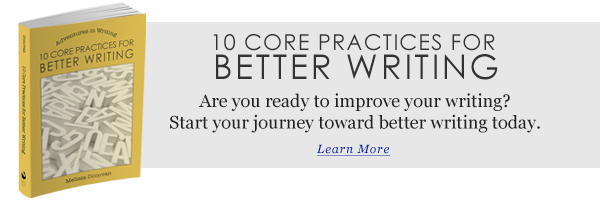It’s an old adage for writers: know your audience. But what does that mean? How well must we know the audience? And does knowing the audience increase our chances of getting published or selling our books?
Some writers insist that the best way to write is to just write for yourself. Sit down and let the words flow. It’s true that sometimes a freewheeling approach will result in some of your best work. And writing that way is immensely enjoyable. But there are times when a writer must take readers into consideration.
So we have these two contradictory writing tips: know your audience and write for yourself. Taken together, they don’t make much sense, so let’s sort them out. Today, we’ll focus on knowing your audience.
In business, academic, and other types of formal writing, the audience is a consideration from the very beginning. You wouldn’t write a business letter peppered with internet shorthand (LOLs and OMGs), and you shouldn’t use casual language in an academic paper. In instances like these, it’s easy to see why you must keep your reader in mind throughout the entire project, but what about poetry, creative nonfiction, and fiction writing? Should the work be influenced by its intended readers? At what point does the audience begin to matter? And who is the audience, anyway?
Goals Matter
Some writers know they want to write children’s books, so they keep a young audience in mind. After all, it wouldn’t do to write a children’s book laden with adult language or love scenes. Other writers want to publish a memoir, hoping their own personal story will inspire others. And if you’re hoping to inspire people, you should have a good idea about which people you want to inspire.
These types of writers have specific goals, and their writing must be aligned with those goals.
That’s why in some cases, it’s essential to know who your audience is before you begin writing. But there are other cases when the goals aren’t so clear, and therefore, neither is the audience. In cases like these, does a writer ever need to think about readers?
Goals Aren’t Always Necessary (and Neither is an Audience)
When you write for the sheer joy of writing or love of craft and you do so without any particular goal in mind, the creative magic can sweep you away. When I wrote my novel for NaNoWriMo in 2008, I started with nothing more than a few characters. My only goal was to write at least 50,000 words. I didn’t give a thought to the audience. And I’m certain that approaching the project this way, with an open mind and without any particular goal in terms of content, is what enabled me to actually complete the first draft of my first novel. It felt like quite an achievement.
When I finished my novel, I knew instantly who the audience was. I had written a young adult novel! If I ever decide to revise that (very rough) first draft and polish it for publication, knowing that the book is geared toward young adults will be helpful in informing the way I approach editing and proofreading. I’ll pay attention to the language to make sure it’s age-appropriate, and I’ll make sure the characters, themes, and everything else are suitable for the target age group.
Agents and publishers often specialize in specific types of writing; they cater to clearly defined audiences. Therefore, as a writer, it helps to know who the audience will be when polishing a manuscript and looking for publication opportunities. This becomes even more critical once the book gets published and marketing begins.
The Benefits of Knowing Your Audience (and When It’s Absolutely Necessary)
If you write in a journal and nobody ever sees your work, then you don’t need to think about an audience. Readers come into play when you decide to publish your work. There’s a point when you decide that you want to cross over from writer to published author, and it’s at that point that the audience starts to matter in a big way.
Agents and publishers can’t do much with your work if the audience is unclear. This is particularly relevant with fiction and nonfiction. There are dozens of poetry markets, so chances are, you can find your audience after the writing is done and polished. But other genres need to be marketed to the right readers. This is also a factor in blogging and self-publishing.
Publication is the point where your art shifts into business mode. It’s the stage when you say, “I want to do this for a living and make money doing it.” That means you’re going to have to sell, and anytime you’re selling anything, you need to know to whom you’re selling.
Some Writing Tips Aren’t Absolute
So, the answer isn’t all that clear. There are some writers who need to know their audience from a project’s conception. Others don’t need to consider an audience until they decide to try getting published. But one thing’s certain: once you set your sights on publication, that means you’re looking for readers. And since readers are your audience, you’ll have to give them some consideration.
Do you think about your readers while you’re writing? Are you concerned about getting published? Do you believe that knowing your audience is more beneficial than writing for yourself? What are some of your favorite writing tips?






I didn’t think much about audience while I was writing my first (yet-to-be-published) novel. I wanted to get these ideas down on paper before they drove me completely crazy.
Now that I’m done, I do think about what audience would both enjoy and “get” the novel. And the conclusion I’ve come to is— I’m not sure. Thanks for an interesting and informative article.
I like your approach. I did think about audience before I started my current project, but it was obvious (science fiction). Other than that, I don’t think about audience unless I’m revising (for fiction, anyway). It will drive you crazy if you worry over what people will think about every word and sentence. I say save that kind of thinking for when you’re ready to polish it.
I write a blog or two, poetry, and am working on a novel. I’m unpublished because I haven’t really put so much thought or effort into discovering an audience. Because I have a degree in Creative Writing, this is my worst flaw in this category.
Writing for oneself is enjoyable and challenging, but I think there is definitely a time when writers make the switch and become audience-conscious. I agree that becoming audience-conscious usually aligns with a writer’s desire to have his or her work published.
Hi Terry. I’m working on a novel too, and I don’t think much about audience while I’m writing the first draft. I did think about the audience before I started, just because the genre (science fiction) was so obvious. I’ll put a lot more thought into audience when I’m revising and preparing to publish and market the book, many months (years?) from now.
Like many others here, I make my living from a variety of types of writing. My main source of income is through technical writing, where the audience is absolutely key. An understanding of how your reader will look at and interpret the information you’re supplying has to be built-in from the start.
I also write for websites and I find that ensuring the reader has an enjoyable experience as well as a clear one is also essential there.
Where I think it differs is in fiction writing. Like most people, I read a lot of different writers and styles. Right now I’m reading Fight Club by Chuck Pahlaniuk and I find the style refeshing, but not necessarily written for the reader if you know what I mean. It’s a bit twisted and takes a bit of following. Likewise, I find James Ellroy’s books to be difficult to follow and read. Contrast that with someone like JJ Connolly (Layer Cake) or Christopher Brookmyer or Carl Hiaasen and you can see that some writers write in a clear style, possibly driven by their understanding of the reader, and others write for themselves, often producing a highly stylised outcome that can be equally as enjoyable.
Personally, I’m not a fan of obtuse writing that is difficult to digest. I prefer writing that is clear and concise. However, I do like when the story itself (plot and characters) is complex. I guess I’d rather put intellectual effort into understanding the events and people in a story than in deciphering complicated language. I do love prose that is beautifully composed though.
The problem with this author’s argument is the feeling that an author can just sit down and write a book and THEN decide what the audience is.
It’s not an argument. It’s what actually happened.
Hey Melissa
Your posts are more energizing than double-shot espresso 😉
I enjoyed your coherent and concise exploration of this subject – thank you #HUGS
Kitto
You’re welcome.
Hi,
I have just completed an edit and polish course and I am still not sure what genre my book falls into.. It’s a based on my own story but I’ve changed the names and added a substantial chunk of fiction so what does that make it?
My audience? Again, I’m not sure. If anyone reads and enjoys it, I’d be chuffed to bits but I don’t know who I’m aiming it at..
Hi Rosie. If you’ve fictionalized a real-life story, it’s fiction. It’s impossible to say which genre it is based on the information you’ve provided. But I’d recommend exploring the different genres at a bookstore (online bookstores are easy to peruse) and researching the definitions of various genres. That should help you find your answer.
I rate this blog with a two thumbs-up, Melissa. To, effectively, connect with the readers, you must know the audience. A writer will increase chances of success if they master this technique. Thank you for sharing.
Wow, Derrick, thank you. I appreciate the compliment!